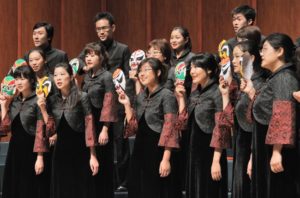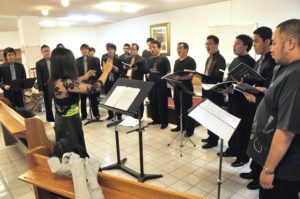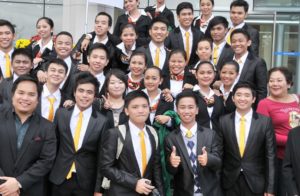Busan International Choral Festival & Competition 2011
From Musical Fellowship to Choral Excellence
Henri Pompidor
choir director and instructor
The motto of every choral convention is, without doubt, that ‘those who gather together to sing always share their very best’ (Lasserre). This was certainly the case during the ninth Busan Choral Festival & Competition (the ninth festival but seventh competition), which took place from 2nd to 5th November in the Korean city of Busan. The spirit of musical fellowship with which the gathering was conducted fostered choral excellence, inspiring each participant’s best efforts. The general level of musical performance represented yet another step forward in the Festival’s history. Our South Korean friends from the Korea Choral Institute and the Metropolitan City of Busan surpassed themselves in organizing an event that offered fulfilment and pleasure to guest choirs from twelve different countries. All participants were welcomed graciously and efficiently, so that everyone participated in the competition and festival activities under the best possible conditions.
Though the main competition took place in the Busan cultural centre, participants gave concerts in various other venues in the city, where they received a warm reception from South Korean audiences. A rich exchange took place over these four days between the visiting singers and the citizens of Busan and the region. The latter, whether they were connoisseurs or interested novices, shared the visiting singers’ pleasure in the encounter. The eclectic program of the opening concert, a festival high point, allowed the audience to enjoy listening to many of the choral groups present. Its climax was a beautiful, strong performance of Mozart’s Coronation Mass (K345) by the Festival’s joint choirs and the Boystown Symphony Orchestra, an orchestra made up of young musicians from the city of Busan, conducted by their youthful leader, Chung Min.

The Festival divided competitors into various categories. That of mixed voice choirs gave the audience the chance to hear the Cebu Chamber Singers (Philippines), an ensemble whose great musical maturity was accentuated by the alternating positioning of choristers and by a repertoire that included a wide range of musical styles and carefully assembled compositions. However, it was a Japanese choir that won the majority of votes from the jury: the Okazaki High School Choir. This young choir, with its undeniable vocal excellence, exhibited a mastery of dynamic contrasts rarely encountered among high school choirs. The Renwen Philharmonic Choir of Wuhan University (China), however, placed its bets on a selection of contemporary pieces. The excellent arrangement and execution of these pieces, however, could not compensate for the vocal weaknesses which, in competitions such as this, often prove crippling. Nevertheless, this group displayed nearly perfect vocal consistency and an exceptionally refined musical sense.
In the second category, equal voice choirs, an Indonesian group, the Volga Male Chorus of Bandung (Indonesia) carried away all the votes. The vocal richness of this group was immediately evident. This choir’s programme was a work of veritable musical time travel. It began with several Renaissance pieces by Jakob Handl, then brought us progressively forward, culminating in compositions of the modern repertoire (Nystedt, Chihara). A judicious choice of performance pieces always affords a choral group an advantage, especially in terms of the variety and daring of its repertoire.

Folk songs formed a third category. Here, too, the jury expressed its enthusiasm for the high degree of preparation evident among the choirs participating. Through song and gesture, they brought new life and energy to traditions and images of the daily routines of often bygone eras. The Renwen Philharmonic Choir of Wuhan University ushered us magically into the heart of ancient China, while the Iuventus Svitavy and the Cebu Chamber Singers took us on voyages into the Czech countryside and the South Philippines, respectively. The latter choir, which won the Grand Prize, once again put its musical excellence on display in its vocal consistency, its musical coordination, and the dynamism of its flawlessly executed choreographed gestures. The last competitive category, jazz choirs, was well represented by a Korean group, Maytree (South Korea), who proved to be assiduous interpreters of the genre, masterfully skilled in the particularities of jazz music with its unique rhythms, dynamic transitions, contrasting sonic structures and extemporized variations.
The Busan Choral Festival & Competition has thus confirmed its place among great international choral competitions. The pains taken by its organizers and the high quality of the participating choirs together guarantee a competition of the highest order. This Festival now plays, and will continue to play a major role in the Asian musical world and, one can rest assured, on the international stage. The efforts made by the Metropolitan City of Busan, the Korea Choral Institute, and the Korean Ministry of Culture, Sports and Tourism to develop this Festival and render it accessible to numerous choirs from throughout Asia and beyond, were considerable. The festival promotes choral music throughout the continent, and supports the developing understanding of choral music as a fundamental component of educational programs.

Allow me to conclude by suggesting that, for all the participants in this collective musical event, though it may be institutionalized in a competitive format, its greatest achievement consists in the opportunity it presents for sharing, for mutual encounter, and for forming musical ties of friendship. In other words, for us to ‘get in tune’.
Edited by Gillian Forlivesi Heywood, Italy